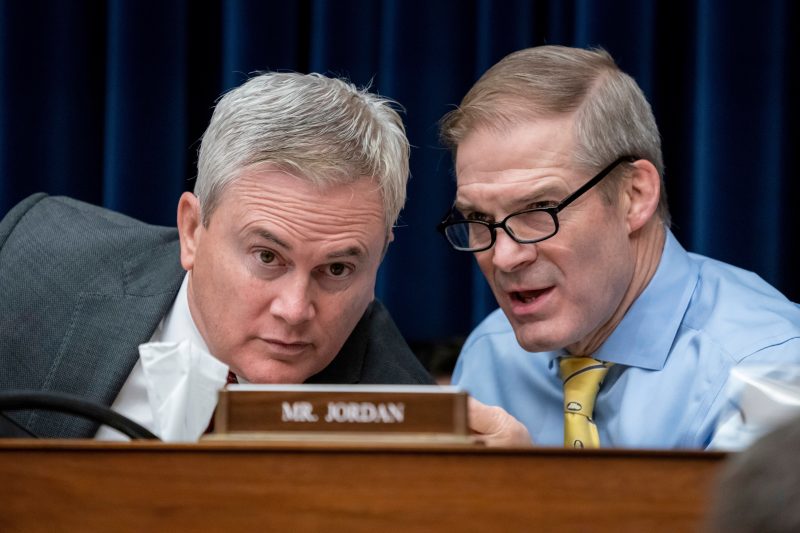It was a quote that might have escaped notice. In the New York Times’s long profile of House Oversight Committee Chairman James Comer (R-Ky.), another powerful Kentuckian offered a comment that, on its face, praised Comer.
“He’s likely to do it in a more kind of levelheaded, less flamboyant way than some members of the House might do that job,” Senate Minority Leader Mitch McConnell (R-Ky.) said. McConnell added: “He’ll do it as well as anyone could. What we don’t know is whether anyone could.”
The idea that Comer is actually acting in a measured way is debatable, as Philip Bump writes for The Washington Post. The oversight chairman has often offered broad theories about government and Democratic malfeasance with little to back them up. “It’s nearly all innuendo, a big corkboard with lots of pictures but little interconnecting string,” as Bump puts it.
But McConnell’s characteristically careful choice of words is interesting: He seems to advise against Comer’s and the GOP’s probes of the purported “weaponization” of the government entering territory favored by the more conspiratorial voices in the House.
And there’s more where that comes from.
The GOP’s effort to cast the government’s treatment of Republicans and Donald Trump as a vast conspiracy has at times tempted some Republicans to try to check their colleagues — often very subtly, of course.
On Tuesday, the day the Comer profile was published, some Senate Republicans urged caution regarding a letter from Comer and other House GOP chairmen requesting investigative information from Manhattan District Attorney Alvin Bragg, as Bragg’s decision on whether to seek a Trump indictment neared.
“I personally prefer to see them work on the agenda they ran on and that got them the majority,” Sen. John Cornyn (R-Tex.) told Axios.
The same outlet also quotes two other Senate Republicans offering similar messages.
“I think you’ve got to fall short of getting involved in the legal process,” Sen. Thom Tillis (R-N.C.) said.
Added Sen. Jerry Moran (R-Kan.): “You want to know lots of facts before you set down that path.”
The concerns here are apparent: This would be the federal government potentially infringing on local law enforcement’s decision-making process in real time — before charges are even brought. It would also involve asking Bragg to offer details of an ongoing investigation, which is generally a no-no. Bragg has labeled it an effort to intimidate him.
(Relatedly, House Republicans have controversially empowered Ohio Rep. Jim Jordan’s new “weaponization” subcommittee to probe ongoing Justice Department investigations, which the Justice Department has understandably balked at.)
Similar words of caution crept in in August, after many Republicans leaped to cast the Justice Department’s search of Trump’s Mar-a-Lago residence as proof of this “weaponization.” They did so despite knowing next to nothing about the situation.
“The only way you beat the world’s greatest democracy is from within, turning American on American,” said Rep. Brian Fitzpatrick (R-Pa.), a former FBI agent. “It’s incumbent upon everybody to act in a way that’s becoming of the office they hold and that’s not casting judgment on anything until you know all the facts.”
Former Rep. John Katko (N.Y.), then the top Republican on the House Homeland Security Committee, said, “This is not something you rush to judgment on … It’s incumbent upon everybody to take a deep breath.”
Rep. Chris Stewart (R-Utah), a member of the House Intelligence Committee, even suggested at the time that such a search might be warranted if Trump were keeping information on highly sensitive special-access programs. “Do you know how extraordinarily sensitive that is?” Stewart told Politico. The Washington Post later reported that such information was indeed seized.
But perhaps the most interesting comment on this front came last month from Rep. David Joyce (R-Ohio). Ahead of the “weaponization” committee’s first hearing, the former prosecutor and leader of a more-moderate faction of the House GOP appeared on CNN.
“If they’re truly ‘weaponizing,’ then show the facts. There’s been a lot of allegations made, as you alluded to,” Joyce said. “But I think it’s very important that if they have these hearings, at the end of the day, they produce something to show either tangible facts or back off that so people can have confidence in their government.”
There is reason to urge caution. Polling suggests that Americans are skeptical of the GOP’s “weaponization” push. In a recent Washington Post-ABC News poll, 56 percent of those surveyed said the GOP’s effort to probe “claims that federal agencies are biased against conservatives” is just an attempt to score political points, versus 36 percent who said it is a legitimate investigation. Crucially, that suggests skepticism of the framing rather than of the need to investigate the actions.
These kinds of hearings have also quickly devolved into unsubstantiated allegations. Chief among them: the claim that the FBI was directly involved in censoring a story about Hunter Biden late in the 2020 campaign. Republicans have often stated this as fact despite its being undermined by both key witnesses testifying under oath and a journalist involved in the “Twitter Files.”
Republicans have also stocked these committees with many of their more extreme members; the House Freedom Caucus is vastly overrepresented on both the Oversight Committee and the “weaponization” panel.
The risk, as we noted back then, is that this empowers members like Rep. Marjorie Taylor Greene (R-Ga.) to drive and define the investigations and to turn them into exercises in service to the base. What McConnell and others seem to be suggesting is that perhaps that’s not the most advisable course.

